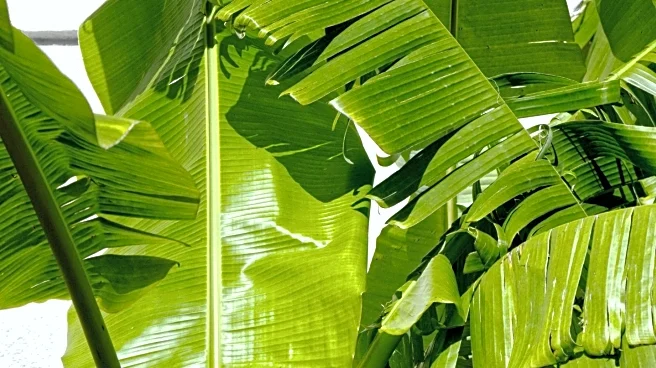What's Happening?
The Cavendish banana, a staple in grocery stores worldwide, faces a significant threat from Panama disease, specifically the Tropical Race 4 strain. This soil-borne fungus, first identified in Taiwan in the 1990s, has spread to Latin America, a major
banana export region. The disease attacks banana plants by clogging their water and nutrient systems, leading to their eventual death. The Cavendish banana's genetic uniformity, due to its sterile nature and propagation through cloning, makes it particularly vulnerable to this disease. The lack of genetic diversity in commercial banana plantations exacerbates the problem, as monocultures are more susceptible to widespread disease outbreaks. Norfolk Botanical Garden is actively participating in global efforts to conserve plant diversity, emphasizing the importance of biodiversity in maintaining resilient ecosystems.
Why It's Important?
The potential disappearance of the Cavendish banana highlights the broader issue of genetic uniformity in agriculture, which can lead to increased vulnerability to diseases. This situation underscores the importance of biodiversity in agriculture and ecosystems, as genetic diversity provides resilience against environmental threats. The loss of the Cavendish banana would impact global food supply chains, affecting economies reliant on banana exports. Norfolk Botanical Garden's initiatives in plant conservation serve as a critical reminder of the need to preserve genetic diversity to safeguard food security and ecosystem health. By educating the public and supporting conservation efforts, botanical gardens play a vital role in promoting sustainable agricultural practices.
What's Next?
Norfolk Botanical Garden is set to open the Perry Conservatory in spring 2026 as part of its Garden of Tomorrow expansion. This facility will feature tropical and desert biomes, showcasing the diversity of plant life and highlighting species at risk. The conservatory aims to educate visitors on the importance of plant conservation and the interconnectedness of ecosystems. As the threat to the Cavendish banana continues, efforts to develop disease-resistant varieties and diversify banana cultivation practices are likely to intensify. Stakeholders in agriculture and conservation will need to collaborate to address the challenges posed by monocultures and promote genetic diversity in crops.
Beyond the Headlines
The crisis facing the Cavendish banana serves as a cautionary tale about the risks of monoculture farming and the loss of genetic diversity. It raises ethical questions about agricultural practices that prioritize uniformity and yield over resilience and sustainability. The situation also highlights the cultural significance of bananas, a fruit enjoyed globally, and the potential impact on communities that rely on banana farming for their livelihoods. Long-term shifts in agricultural practices may be necessary to prevent similar crises in other crops, emphasizing the need for a balanced approach to food production that considers ecological health and economic viability.















